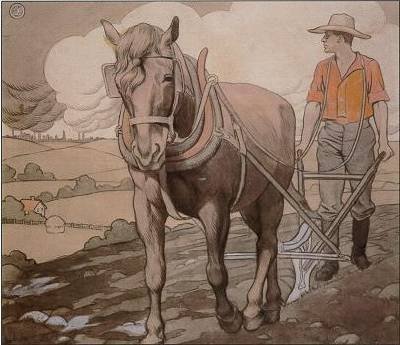The Farmer & the Horse - Good or bad?
Once upon a time, because all good stories start that way.
Once upon a time, there was a farmer in a small village who had a single horse that he used to make a living on his farm.
The other villagers would exclaim how fortunate he was to have such a strong horse.
"Maybe," he would reply, keeping his mind calm and present.
One day, the horse ran away.
The villagers expressed their dismay at this terrible turn of bad luck.
"Your horse ran away. How terrible" the villagers said
"Maybe," the farmer replied, calmly. Now come, let us meditate and give thanks for all that is.
A few days later, the horse returned home, with and behind him were a dozen wild horses, which the farmer was able to put in his barn. He was suddenly a wealthy man with all these new horses.
"What good lucky fortune." the villagers said.
"Maybe," the farmer replied, smiling at his neighbours.
The following week, the farmer’s son was riding one of the wild horses in the fields, when it bucked him off and he broke his arm and leg.
The villagers arrived to express their sorrow
"What a terrible thing to happen to your only son," they said.
"Maybe," the farmer replied, mindfully, while tending to his son.
The next month, a general of the army arrived in the village, to recruit every able-bodied young man for the war that was brewing on the border.
The farmer’s son, with his broken leg and arm, was not recruited.
The villagers were happy for the farmer.
"Your son has been spared. Thank God" they said.
The farmer with his enigmatic smile knew that he had little control over the events that unfolded. simple replied,
"Maybe,"
He is a strange man the villagers all thought.
Lessons to Remember:
The story of the farmer and the horse teaches us to embrace the unknown, to be open-minded, and to accept whatever life throws at us with equanimity.
The two key takeaways from this story are:
1 Embrace "Maybe" Mind:
The farmer's response to the events that unfolded in his life was always the same - "Maybe."
He did not judge the events as good or bad but simply allowed them to exist, without attaching any meaning to them.
This is the essence of the "Maybe" mindset, which allows us to accept the ups and downs of life, without getting too attached to them.
It is mindfulness in action.
2 Let Go of the Narrative:
The villagers in the story constantly tried to put a positive or negative spin on events, based on their own biases and prejudices.
But the farmer knew events are essentially neutral and it is our own interpretation that gives them meaning.
This concept can be applied to our own lives, where we go through periods of growth, struggle, and new beginnings.
To embrace this, we must enjoy the good times, knowing that our struggles are a fertilizer for new growth.
As humans, we have a natural tendency to create stories to explain the unexplainable. However, it's important to separate the narrative from the facts and allow events to exist without applying a judgmental layer.
This mindfulness allows us to flow with life's changes and avoid unnecessary suffering.
To cultivate a "maybe" mindset, we must embrace chaos and avoid judging it. The only constant in life is change, and we must learn to flow with it.
Remember these two lessons: life is cyclical, and events needn't be judged. Embrace the changes and flow with them, and allow events to simply exist as they are.
May this simple story help you live more gently, as it has for me.
David is a Vancouver life coach and mindfulness teacher.
Book time for a conversation if you are curious about life coaching


